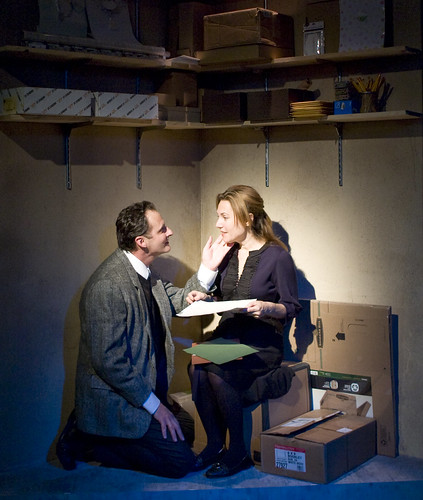Opened May 9, 2009 at SF Playhouse
Jackson Davis and Amy Resnick are Dwight and Jean, two lovers awash in a sea of cynicism, stationery and sentiment in Sarah Ruhl’s Dead Man’s Cell Phone at SF Playhouse. Photos by Zabrina Tipton.
In Ruhl’s quirky `Phone,’ we get the message
«««
There are few things more enjoyable, theatrically speaking, than watching Amy Resnick on stage. The veteran Bay Area actor fascinates, compels and entertains in ways entirely her own. She’s completely reliable and always surprising.
In Sarah Ruhl’s Dead Man’s Cell Phone, now at the SF Playhouse, Resnick has found an ideal role: Jean, a seemingly nondescript woman who happens to be in a café eating lobster bisque when the guy next to her ups and dies. When his cell phone keeps ringing, she answers it and, in a manner of speaking, finds her calling. Jean is a blank slate, quite literally. Here’s what we find out about her life over the course of the play’s two hours: she reads in cafes, she likes lobster bisque, she’s a vegetarian (one that apparently eats shellfish), she’s a little bit religious, she occasionally goes to the pharmacy, she works in the office of a Holocaust museum and she is titillated by the feel of quality stationery.
Oh, and Jean lies. With good intentions.
In some ways, Ruhl’s play is like a Frank Capra movie. Jean is sort of an angel who wants to reassure the people in the dead man’s life – his name was Gordon, he did something really creepy and immoral for a living – that Gordon was a good man who, despite his behavior, really and truly loved and valued them. The only way she can do that is by lying to them, making up Gordon’s good intentions. She presents gifts he supposedly wanted his mother, his widow and his brother to have. She tells the widow and the mistress exactly what they want to hear to make them think Gordon loved them sexually and emotionally.
It’s extraordinary how much she lies – and how much her lies mean.
But this isn’t Frank Capra, and Jean is not a kindly spirit helping Gordon get his angel’s wings. This is a Sarah Ruhl play, which means it’s a peculiar play in the best sense. We’ve seen Ruhl’s work at Berkeley Repertory Theatre (the exquisite Eurydice and, more recently, the fascinating In the Next Room (The Vibrator Play) and at TheatreWorks (The Clean House). She’s one of the hottest playwrights in the country and for good reason. Her work is like nothing on television. She’s a deeply intelligent and emotional writer unafraid of connecting with her audience. Dead Man’s Cell Phone (also being done at the Oregon Shakespeare Festival this season) is Ruhl working in a lighter vein, but there’s still an undercurrent of darkness, and she’s unafraid, even in a quirky romantic comedy such as this, to indulge her fascination with death and the afterlife.
Ruhl’s work is all about connection, or lack thereof, and in Dead Man, she focuses in on cell phones. Jean describes not having a cell before she “inherited” Gordon’s because she liked to “disappear.” “But it’s like when everyone has their cell phone on, no one is there. It’s like we’re all disappearing the more we’re there.”
Jean is something of an innocent – perhaps psychologically damaged, we don’t know – and Resnick imbues this cipher with a rich inner life. There’s much about Jean we don’t know, but with Resnick inhabiting her skin, we know all we need to know about her compassion, her depth of feeling, her best intentions, her sentimentality.
Ruhl courts sentiment here as a defense. The play’s most touching scenes are between Resnick’s Jean and Jackson Davis as Dwight, Gordon’s brother. The two bond over caramel popcorn then visit Dwight’s stationery store, where they promptly fall in love. Dwight likes that she’s sentimental. “No one wants to remember anything,” he says. “I want to remember everything,” Jean answers, “even other people’s memories.”
Dwight hates the digital world because it’s so impermanent. “All the digital…stuff…the information bits..flying through the air. No one wants to remember People say I love you on cell phones and where does it go? No paper. Remembering requires paper.”
Ruhl is an extraordinary writer, and her brilliance rings throughout Dead Man’s Cell Phone. Director Susi Damilano’s efficient production can’t quite overcome the moments when Ruhl runs out of imagination in the second act – Jean ends up, improbably, in Johannesburg and then with Gordon in sort of a heavenly way station. Some of the smaller roles don’t quite land because the comic/dramatic tone of the play keeps shifting.
Joan Mankin, as Gordon’s mother, delivers a hilariously heartbreaking eulogy about vaulted ceilings and using cell phones on the toilet, and Rachel Klyce as Gordon’s widow gets a fun drunken scene with Resnick that turns on sexual frustration.
SF Playhouse artistic director Bill English, who also plays Gordon, designed the set, which had a few stumbles on opening night. Ruhl’s plays require a fluid, almost cinematic production with highly theatrical flourishes, and while the intimacy of SF Playhouse is great for actors like Resnick, the small space can sometimes cramp the ambitions of the play itself.
Even with the uneven second act, Dead Man’s Cell Phone rights itself by the end, and the final scene (involving Resnick and Jackson, naturally) is one of the most potent in recent memory, sentimentality and all.
FOR MORE INFORMATION
Sarah Ruhl’s Dead Man’s Cell Phone continues through June 13 at the SF Playhouse, 533 Sutter St., San Francisco. Tickets are $40. Call 415-677-9596 or visit www.sfplayhouse.org for information.
SF PLAYHOUSE ANNOUNCES NEW SEASON
Bill English and Susi Damilano have announced the 2009-10 SF Playhouse season, which will be themed as “The Power of Laughter.”
- The world premiere of Billy Aronson’s First Day of School directed by Chris Smith (Sept. 23-Nov.)
- David Greenspan’s She Stoops to Comedy directed by Mark Rucker (Nov. 18-Jan. 8 )
- Amy Glazer directs a play TBA (Jan. 20-Feb. 27)
- Stephen Adley Guirgis’ Den of Thieves director TBA (March 10-April 17)
- Allison Moore’s Slasher, director TBA (April 28-June 5)
- Terrence McNally and David Yazbek’s musical The Full Monty (June 16-Sept. 5)



Pingback: Topics about Laughter | Review: `Dead Man’s Cell Phone’
Pingback: Review: `Dead Man’s Cell Phone’ < It’s all about the trends
Fascinating to hear about the differences between Resnick’s performance and what I observed Sarah Jane Agnew build while working on the production at OSF. I think there’s so much room for this character to stir the imagination. It’s nice to read a review that was swept up in the main character’s portrayal, rather than focusing on the play’s whirlwind, absurdist / happy ending.